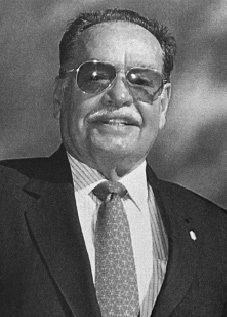Alejo Peralta
Alejo Peralta y Diaz Ceballos, Mexican industrial pioneer and government collaborator, died on April 8th 1997, aged 80
The industrial revolution came late to Mexico, perhaps because it was held back by other less beneficial revolutions. Alejo Peralta, who as much as anyone fostered industrialisation in Mexico, set up in business in 1939. By then, Britain’s industrial revolution, founded on James Watt’s steam engine, had been pounding away for some 170 years, and Henry Ford, the pioneer of assembly-line production, was an old man. Anything on sale in Mexico that was made in a factory quite likely came from America or Britain. “I was the beginning of Mexican industrialisation,” Mr Peralta liked to say. It was not wholly true, but he was enough of an innovator for the claim, made with his usual forcefulness, to go unchallenged.
In setting out to change things, Mr Peralta had, as it happened, the same obsessive interest in how things worked that had motivated Watt and Ford. His father had sold and serviced sewing machines (American ones) and Alejo recalled playing with spindles and other bits of discarded machinery. After getting some training as an engineer, Mr Peralta set up his first enterprise with a capital of 650 pesos (about $1,400 today) and a staff of two. He made candles from waste material he obtained free. Using Bakelite, an early plastic, he turned to making buttons for industrial clothing. By 1943 he had 200 employees producing conductors and other electrical goods. At his death his Industrias Unidas Sociedad Anonima, known as IUSA, was a conglomerate of more than 100 companies, producing a range of goods from ballpoint pens to cellular telephones. Last year, Forbes magazine reckoned the Peralta family was worth $2.5 billion.
It has to be said, though, that Mr Peralta’s rise to riches was not entirely a triumph of selfless individualism. It owed a lot to his successful cultivation of leaders of the Institutional Revolutionary Party, or PRI. The party set out in the 1920s with the admirable aim of building a free and progressive society after a century of revolutions, civil war and fights with the United States. But in 70 years of power, the PRI has turned Mexico, although formally a democracy, into an authoritarian one-party state. Mr Peralta went along with the policies of the party, cultivating its leaders. He was an adviser to President Gustavo Diaz Ordaz during modern Mexico’s darkest hour, when the army, acting under government orders, calculatedly opened fire with machineguns on a demonstration in Mexico City’s Tlatelolco Plaza in 1968, killing hundreds of people.
In an interview in 1992 Mr Peralta defended the massacre, claiming that the stability of the country was under threat. At the time, he said, “you feel bad that there were so many victims, but over time you understand that this was necessary”. Stalin could not have put it better, but other Mexican businessmen who have done well under the government’s patronage share his view. Indeed, perhaps the main interest in Mr Peralta’s life is that it was an archetype of the relationship between tycoon and government which has become commonplace, not only in Mexico but elsewhere; for example, in South Korea.
But whereas ordinary Koreans have done well from the unholy alliance, Mexico remains distressingly poor. In a couple of generations, South Korea, once a country of peasants, has developed a large middle class. In Mexico, according to a United Nations report published last year, 43% of the rural population and 23% of those in towns live in poverty. Mr Peralta reckoned that his companies provided work that supported more than 13,000 families. Other Mexican industrial firms could proudly produce comparable figures. But these firms are oases in a desert of the unemployed and underemployed.
If the inequities of Mexican society bothered Mr Peralta, he had the consolation of baseball, for which he had a passion. In the 1930s he played professionally for a time, and when he became rich he founded a baseball team, the Mexico City Tigres. His death was mostly written about in the sports pages of Mexican newspapers, and the Mexican Baseball League called for a period of mourning. Mr Peralta liked to dash about, in sports cars, his helicopter and a private jet. He underwent heart surgery four times. “I’ve lived as I wanted to live,” he said.
But to younger industrialists in Mexico Mr Peralta and his like are dinosaurs who have outlived their time. They fear more decades of underdevelopment and human misery unless Mexico throws off its old ways. Mexico is changing, they say. The PRI is losing elections. Television reporting is less biased towards the government. The sons of the old guard

tend to be well educated, often in the United States. They like to paint a picture of peaceful democratic modernisation. The congressional and other elections due in July will, it is claimed, be cleaner than before. Not difficult, perhaps, but already there are doubts. The PRI, fearing electoral disaster, is expected to spend more than it is legally entitled to in a bid to buy votes. Mexico may be changing, but hardly at a revolutionary pace.